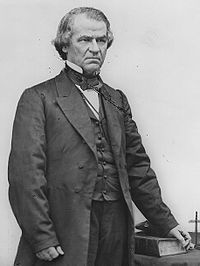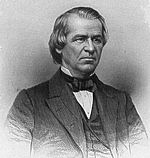Andrew Johnson
From Wikipedia, the free encyclopedia.
- For other people named Andrew Johnson, see Andrew Johnson (disambiguation).
| Term of office | April 15, 1865 – March 3, 1869 |
| Preceded by | Abraham Lincoln |
| Succeeded by | Ulysses S. Grant |
| Date of birth | December 29, 1808 |
| Place of birth | Raleigh, North Carolina |
| Spouse | Eliza McCardle Johnson |
| Political party | Democratic (elected on National Union ticket) |
Andrew Johnson (December 29, 1808 – July 31, 1875) was the sixteenth Vice President (1865) and the seventeenth President of the United States (1865–1869), succeeding to the presidency upon the assassination of Abraham Lincoln. He is regarded to be one of the worst presidents.
Johnson presided over the Reconstruction of the United States following the American Civil War, and his conciliatory policies towards the defeated rebels and his vetoes of civil rights bills embroiled him in a bitter dispute with the Congressional Republicans, leading the House of Representatives to impeach him in 1868; he was the first President to be impeached. He was subsequently acquitted by a single vote in the Senate.
Contents |
Early life
Johnson was born on December 29, 1808, in Raleigh, North Carolina, to Jacob Johnson and Mary McDonough. When Johnson was four his father died. At the age of 13 he was apprenticed to a tailor, but ran away to Greeneville, Tennessee in 1826, where he continued his employment as a tailor. He never attended any type of school; his wife has historically been credited with teaching him to read and write.
Early political career
Johnson served as an alderman in Greeneville from 1828 to 1830 and mayor of Greeneville from 1834 to 1838. He was a member of the State House of Representatives from 1835 to 1837 and 1839 to 1841. He was elected to the State Senate in 1841, and elected as a Democrat to the Twenty-eighth and to the four succeeding Congresses (March 4, 1843 to March 3, 1853). He was chairman of the Committee on Public Expenditures (Thirty-first and Thirty-second Congresses).
Political ascension
Johnson did not seek renomination, having become a candidate for the governorship of Tennessee. He was Governor of Tennessee from 1853 to 1857, and was elected as a Democrat to the United States Senate and served from October 8, 1857 to March 4, 1862, when he resigned. He was chairman of the Committee to Audit and Control the Contingent Expense (Thirty-sixth Congress). At the time of secession of the Confederacy, Johnson was the only Senator from the seceded states to continue participation in Congress. Johnson was then appointed by President Abraham Lincoln as Military Governor of Tennessee in 1862.
National office
He was elected Vice President of the United States on the National Union ticket headed by Republican Abraham Lincoln in 1864 and was inaugurated March 4, 1865. He became President of the United States on April 15, 1865, upon the death of Lincoln. He was the first Vice President to succeed to the U.S. Presidency upon the assassination of a President and the third to succeed upon the death of a President.
Cabinet
| OFFICE | NAME | TERM |
| President | Andrew Johnson | 1865–1869 |
| Vice President | None | |
| Secretary of State | William H. Seward | 1865–1869 |
| Secretary of the Treasury | Hugh McCulloch | 1865–1869 |
| Secretary of War | Edwin M. Stanton | 1865–1868 |
| John M. Schofield | 1868–1869 | |
| Attorney General | James Speed | 1865–1866 |
| Henry Stanberry | 1866–1868 | |
| William M. Evarts | 1868–1869 | |
| Postmaster General | William Dennison | 1865–1866 |
| Alexander Randall | 1866–1869 | |
| Secretary of the Navy | Gideon Welles | 1865–1869 |
| Secretary of the Interior | John P. Usher | 1865 |
| James Harlan | 1865–1866 | |
| Orville H. Browning | 1866–1869 | |
Impeachment
Congress and Johnson argued in an increasingly public way about Reconstruction: the manner in which the Southern secessionist states would be readmitted to the Union. Johnson favored a very quick restoration of all rights and privileges of other states. However, "Congressional Reconstruction", enforced by repeated acts passed over Johnson's veto, provided for provisional state governments run by the military and ensuring the local passage of civil rights laws and otherwise imposing the will of the United States Congress — which, of course, was run by the North. Johnson's public criticisms of Congress provoked much talk of impeachment over the months.

On February 21, 1868, Johnson notified Congress that he had removed Edwin Stanton as Secretary of War, and was replacing him in the interim with Adjutant-General Lorenzo Thomas. This violated the Tenure of Office Act, a law enacted by Congress on March 2, 1867 over the Johnson's veto, specifically designed to protect Stanton. Johnson had vetoed the Act, claiming it was unconstitutional. The Act said, "...every person holding any civil office, to which he has been appointed by and with the advice and consent of the Senate ... shall be entitled to hold such office until a successor shall have been in like manner appointed and duly qualified," thus removing the President's previous unlimited power to fire any of his Cabinet members at will. (Years later in Myers v. United States (1926), the Supreme Court ruled that such laws were indeed unconstitutional.)
The Senate and House entered into hot debate. Thomas attempted to move into the War office, for which Stanton had Thomas arrested. Three days after Stanton's removal, the House passed a resolution to impeach Johnson for "high crimes and misdemeanors", specifically, for intentionally violating the Tenure-of-Office Act and thus violating the law of the land, which he had sworn an oath to enforce.
On March 5, 1868 a court of impeachment was organized in the Senate to hear charges against the President. William M. Evarts served as his counsel. Eleven articles were set out in the resolution and the trial before the Senate lasted three months. Johnson's defense was based on a clause in the Tenure-of-Office Act stating that the then-current Secretaries would hold their posts throughout the term of the President who appointed them. Since Lincoln had appointed Stanton, it was claimed, the applicability of the Act had already run its course.
Johnson was acquitted by a vote of thirty-five for conviction to nineteen for acquittal. He had avoided removal from office by a single vote. There were two votes in the Senate: one on May 16, 1868 for the 11th article, and another on May 26 for the other 10.
Johnson was the first President to be impeached, and the only one until Bill Clinton on December 19, 1998. Both presidents were acquitted.
States Admitted to the Union
Post-Presidency
Johnson was an unsuccessful candidate for election to the United States Senate in 1868 and to the House of Representatives in 1872. He was elected as a Democrat to the Senate and served from March 4, 1875, until his death near Elizabethton, Tennessee, on July 31, 1875. Interment was in the Andrew Johnson National Cemetery, Greeneville, Tennessee.
See also
References
- Newspaper clippings, 1865–1869: http://www.impeach-andrewjohnson.com/
- Series of Harper's Weekly articles covering the impeachment controversy and trial: [1]
- Johnson's obituary, from the New York Times: http://starship.python.net/crew/manus/Presidents/aj2/aj2obit.html
External links
- The Andrew Johnson Administration
- Articles of Impeachment
- White House Biography
- Mr. Lincoln's White House: Andrew Johnson
| Preceded by: Thomas Dickens Arnold |
U.S. Congressman for the 1st District of Tennessee 1843–1853 |
Succeeded by: Brookins Campbell |
| Preceded by: William B. Campbell |
Governor of Tennessee 1853–1857 |
Succeeded by: Isham G. Harris |
| Preceded by: James C. Jones |
U.S. Senator from Tennessee October 8, 1857 – March 4, 1862 |
Succeeded by: David T. Patterson (a) |
| Preceded by: Isham G. Harris |
Governor of Tennessee 1862 – 1865 |
Succeeded by: E. H. East |
| Preceded by: Hannibal Hamlin |
Republican Party(b) vice presidential candidate 1864 (won) |
Succeeded by: Schuyler Colfax |
| Preceded by: Hannibal Hamlin |
Vice President of the United States March 4, 1865 – April 15, 1865 |
Succeeded by: Schuyler Colfax (b) |
| Preceded by: Abraham Lincoln |
President of the United States April 15, 1865 – March 3, 1869 |
Succeeded by: Ulysses S. Grant |
| Preceded by: William Gannaway Brownlow |
U.S. Senator from Tennessee March 4, 1875 – July 31, 1875 (died in office) |
Succeeded by: David McKendree Key |
| Vice Presidents of the United States of America |  |
|---|---|
| Adams | Jefferson | Burr | Clinton | Gerry | Tompkins | Calhoun | Van Buren | R Johnson | Tyler | Dallas | Fillmore | King | Breckinridge | Hamlin | A Johnson | Colfax | Wilson | Wheeler | Arthur | Hendricks | Morton | Stevenson | Hobart | Roosevelt | Fairbanks | Sherman | Marshall | Coolidge | Dawes | Curtis | Garner | Wallace | Truman | Barkley | Nixon | L Johnson | Humphrey | Agnew | Ford | Rockefeller | Mondale | Bush | Quayle | Gore | Cheney |
| Presidents of the United States of America |  |
|---|---|
| Washington | J Adams | Jefferson | Madison | Monroe | JQ Adams | Jackson | Van Buren | W Harrison | Tyler | Polk | Taylor | Fillmore | Pierce | Buchanan | Lincoln | A Johnson | Grant | Hayes | Garfield | Arthur | Cleveland | B Harrison | Cleveland | McKinley | T Roosevelt | Taft | Wilson | Harding | Coolidge | Hoover | F Roosevelt | Truman | Eisenhower | Kennedy | L Johnson | Nixon | Ford | Carter | Reagan | GHW Bush | Clinton | GW Bush |
Categories: 1808 births | 1875 deaths | Autodidacts | Baptists | Governors of Tennessee | Members of the U.S. House of Representatives | Reconstruction | U.S. Republican Party vice presidential nominees | Vice Presidents of the U.S. | United States Senators from Tennessee | Presidents of the United States






